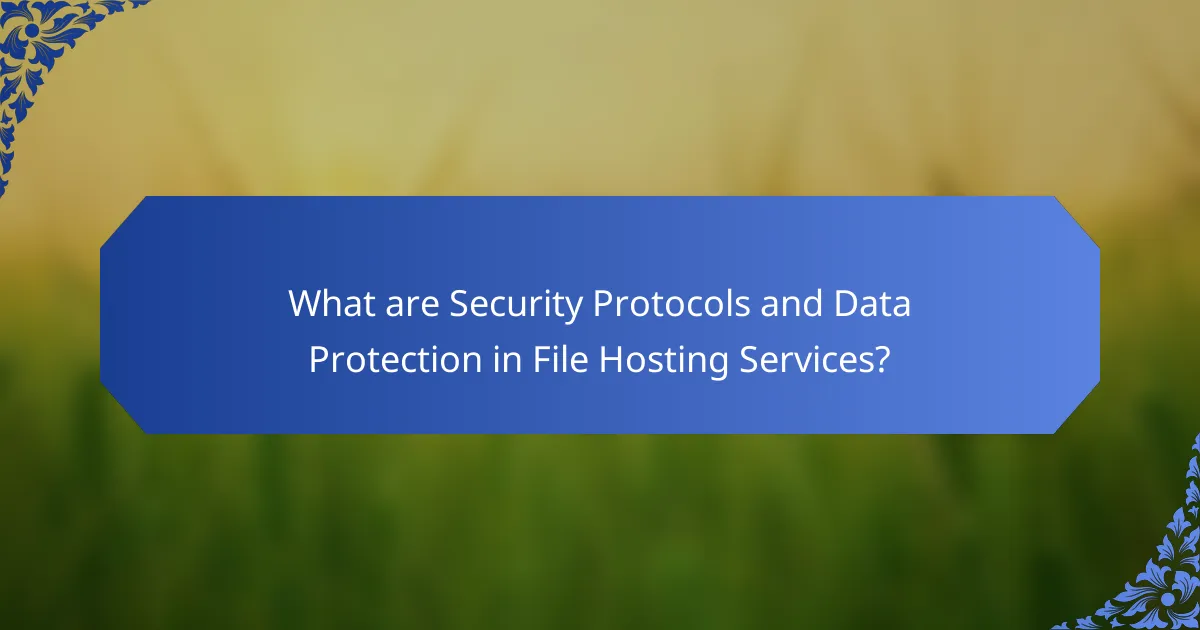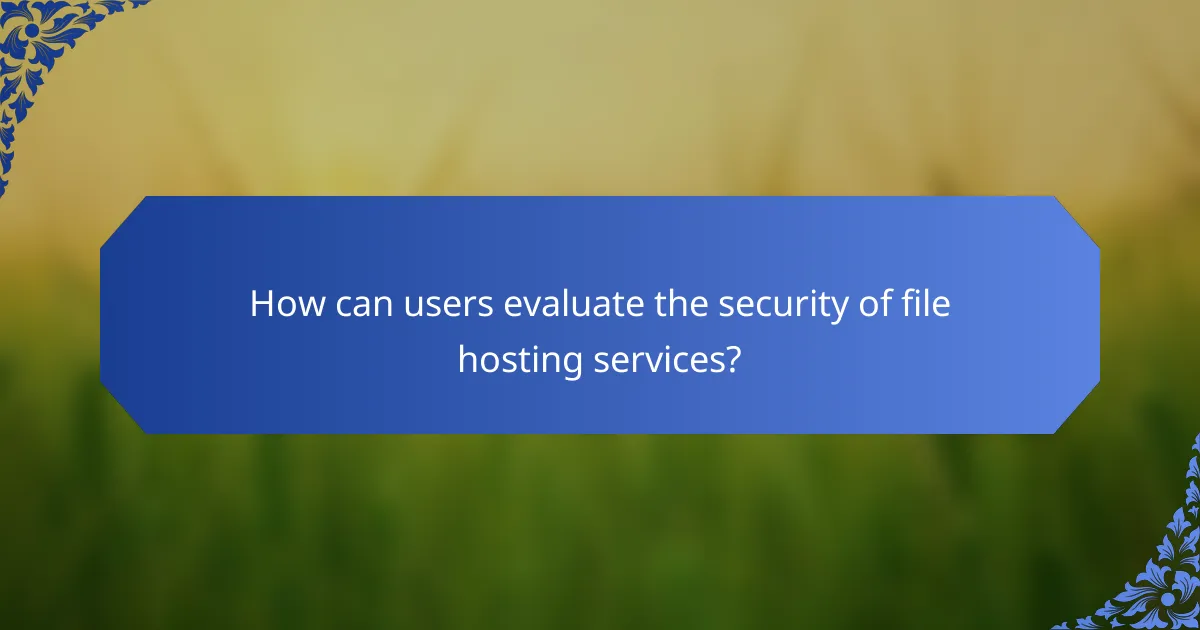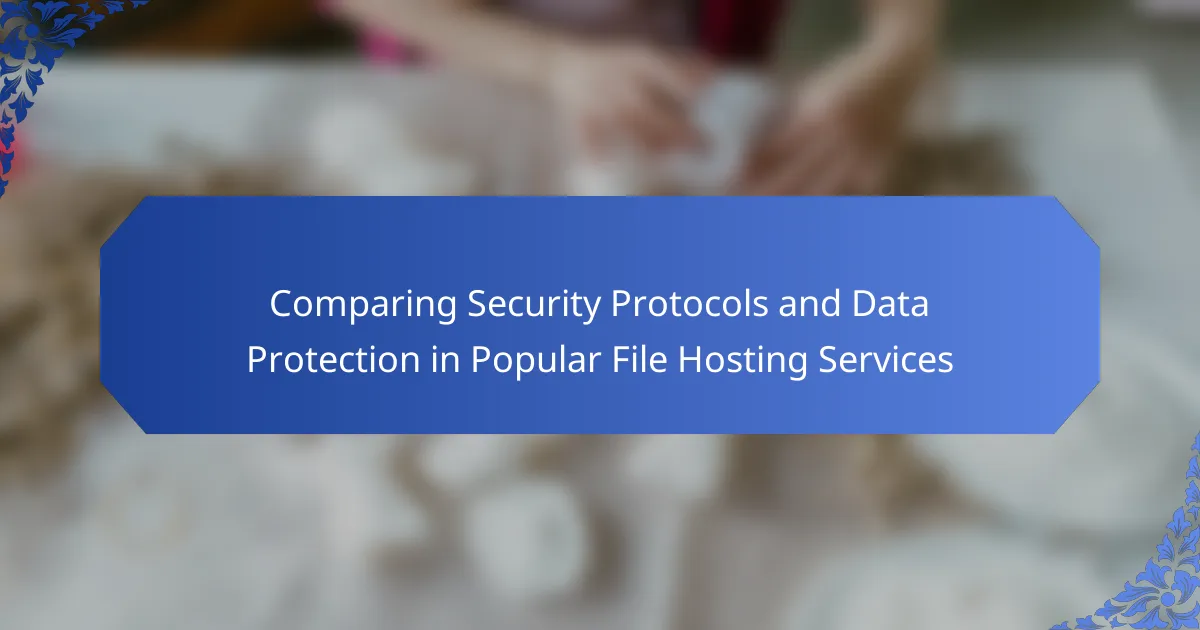File hosting services are platforms that provide cloud storage, file sharing, and collaboration tools, while ensuring the security and privacy of user data. This article examines the security protocols employed by these services, including encryption methods like AES-256, access controls, and compliance with regulations such as GDPR. It highlights the importance of data protection measures, including regular backups and user access management, in safeguarding against unauthorized access and data breaches. Additionally, the article offers guidance on evaluating the security of file hosting services by assessing encryption practices, authentication methods, and privacy policies, along with user reviews and third-party audits.

What are Security Protocols and Data Protection in File Hosting Services?
Security protocols in file hosting services are measures that ensure the confidentiality, integrity, and availability of data. They include encryption, access controls, and secure transfer protocols like HTTPS and SFTP. Data protection involves safeguarding user data from unauthorized access and breaches. This is achieved through regular backups, data masking, and compliance with regulations like GDPR. Effective security protocols reduce the risk of data breaches significantly. For example, using AES-256 encryption can protect data at rest and in transit. File hosting services that implement these protocols demonstrate a commitment to user data security and privacy.
How do security protocols function in file hosting services?
Security protocols in file hosting services protect data during transfer and storage. They ensure confidentiality, integrity, and availability of files. Encryption is a key function, converting data into a secure format. This prevents unauthorized access during transmission. Authentication verifies user identities before allowing access. Protocols like HTTPS and SSL/TLS secure data in transit. They encrypt the connection between users and servers. Additionally, access controls limit who can view or edit files. Regular security audits identify vulnerabilities in the system. These measures collectively enhance data protection and user trust in file hosting services.
What are the main types of security protocols used?
The main types of security protocols used include SSL/TLS, IPsec, and SSH. SSL (Secure Sockets Layer) and TLS (Transport Layer Security) are widely used to secure communications over networks. They encrypt data in transit, ensuring confidentiality and integrity. IPsec (Internet Protocol Security) operates at the network layer to secure IP communications. It authenticates and encrypts each IP packet in a communication session. SSH (Secure Shell) provides secure remote access to systems by encrypting data exchanged between the client and server. These protocols are essential for protecting sensitive information during transmission across the internet.
How do these protocols ensure data integrity and confidentiality?
Protocols ensure data integrity and confidentiality through encryption and authentication mechanisms. Encryption converts data into a secure format, making it unreadable to unauthorized users. This process protects data during transmission and storage. Authentication verifies the identity of users accessing the data. It ensures that only authorized individuals can retrieve or modify the information.
For example, protocols like TLS (Transport Layer Security) use advanced encryption standards to secure data in transit. They also employ hashing techniques to verify data integrity. Hashing generates a unique value for data, allowing detection of any alterations.
Additionally, secure file hosting services implement access controls. These controls restrict who can view or edit files. Logging and monitoring activities further enhance security by tracking access attempts.
Overall, these combined measures effectively safeguard data integrity and confidentiality in file hosting services.
Why is data protection critical for file hosting services?
Data protection is critical for file hosting services to safeguard user data from unauthorized access and breaches. File hosting services often store sensitive information, including personal and financial data. A lack of robust data protection can lead to data theft, loss of user trust, and legal repercussions. According to a 2021 report by IBM, the average cost of a data breach is $4.24 million. Effective data protection measures, such as encryption and access controls, help mitigate these risks. Compliance with regulations like GDPR and HIPAA also mandates data protection, ensuring user rights are upheld. Therefore, prioritizing data protection is essential for maintaining service integrity and user confidence.
What are the potential risks of inadequate data protection?
Inadequate data protection poses significant risks to individuals and organizations. These risks include data breaches, which can lead to unauthorized access to sensitive information. According to a 2021 report by IBM, the average cost of a data breach is $4.24 million. This financial impact can severely affect a company’s bottom line. Additionally, inadequate protection can result in identity theft, where personal information is exploited for fraudulent activities. The Identity Theft Resource Center reported over 1,100 data breaches in 2020 alone, highlighting the prevalence of this issue. Furthermore, reputational damage can occur when customers lose trust in a brand due to security failures. Inadequate data protection can also lead to regulatory penalties, as organizations may face fines for non-compliance with data protection laws like GDPR. Overall, the risks associated with inadequate data protection can have far-reaching consequences for both individuals and businesses.
How do data breaches impact users and providers?
Data breaches significantly impact both users and providers. Users face risks such as identity theft, financial loss, and privacy violations. A study by the Identity Theft Resource Center found that 29% of data breach victims experienced identity theft. Providers suffer reputational damage and financial consequences. According to IBM, the average cost of a data breach for businesses is $4.24 million. Both parties experience loss of trust, leading to potential customer attrition. Users may seek alternative services, while providers may incur regulatory fines. Thus, data breaches create a cycle of harm affecting all stakeholders involved.

What are the key features of popular file hosting services?
Popular file hosting services typically offer features such as cloud storage, file sharing, and collaboration tools. Cloud storage allows users to store files online, accessible from any device. File sharing enables users to send files to others via links or email. Collaboration tools often include real-time editing and commenting on documents. Security features include encryption, both in transit and at rest, to protect user data. Many services provide version control, allowing users to revert to previous file versions. User access controls help manage permissions for file sharing. Backup solutions are also common, ensuring data is not lost. Lastly, mobile access allows users to manage files on the go.
How do different file hosting services compare in terms of security protocols?
Different file hosting services employ varying security protocols to protect user data. For example, Dropbox uses AES 256-bit encryption for files at rest and SSL/TLS for data in transit. Google Drive also implements AES 256-bit encryption and uses SSL for secure file transfer. Microsoft OneDrive offers similar protection with AES encryption and TLS.
Box provides advanced security features, including two-factor authentication and encryption both at rest and in transit. iCloud employs end-to-end encryption for certain data types, enhancing user privacy. Each service has unique security attributes, such as compliance with regulations like GDPR or HIPAA, which further influences their security effectiveness.
In summary, while many file hosting services utilize robust encryption methods, differences exist in additional security features and compliance standards. Users should assess these aspects based on their specific security needs.
What unique security features do leading services offer?
Leading file hosting services offer unique security features such as end-to-end encryption, two-factor authentication, and advanced threat detection. End-to-end encryption ensures that only users can access their files, preventing unauthorized access during transmission and storage. Two-factor authentication adds an extra layer of security by requiring a second form of verification, such as a code sent to a mobile device. Advanced threat detection uses machine learning algorithms to identify and mitigate potential security breaches in real-time. For instance, Dropbox employs file recovery options that allow users to restore lost or corrupted files within a specific timeframe. Google Drive offers robust sharing permissions, enabling users to control access levels for collaborators. These features collectively enhance data protection and user trust in file hosting services.
How do user reviews reflect the effectiveness of these security measures?
User reviews reflect the effectiveness of security measures by providing firsthand accounts of user experiences. They often highlight specific instances where security protocols succeeded or failed. For example, users may report successful data recovery after a breach, indicating robust security. Conversely, negative reviews can point to vulnerabilities that compromised data integrity. Reviews also often include comparisons of security features, revealing which measures are most effective in practice. Quantitative ratings can serve as a metric for overall user satisfaction with security. High ratings typically correlate with perceived effectiveness, while low ratings may suggest inadequacies. Analyzing these reviews helps identify trends in user confidence regarding security measures.
What data protection strategies are commonly employed?
Commonly employed data protection strategies include encryption, access controls, and regular audits. Encryption safeguards data by converting it into a coded format. This ensures that only authorized users can access the information. Access controls limit who can view or manipulate data. They help prevent unauthorized access and data breaches. Regular audits assess the effectiveness of security measures. They identify vulnerabilities and ensure compliance with regulations. Additionally, data backup strategies protect against data loss. These strategies are essential for maintaining data integrity and confidentiality.
Which encryption methods are most widely used in file hosting services?
The most widely used encryption methods in file hosting services are AES (Advanced Encryption Standard) and SSL/TLS (Secure Sockets Layer/Transport Layer Security). AES is a symmetric encryption algorithm known for its speed and security. It is commonly used to encrypt files stored on servers. SSL/TLS provides secure communication over the internet. It encrypts data in transit between the user and the file hosting service. Both methods ensure data privacy and protection against unauthorized access. According to a report by the International Organization for Standardization, AES is recognized for its robust security features. SSL/TLS is widely adopted for securing web traffic, as noted by the Internet Engineering Task Force.
How do backup and recovery processes enhance data protection?
Backup and recovery processes enhance data protection by creating copies of data that can be restored in case of loss or corruption. These processes ensure that critical information is not permanently lost due to hardware failures, cyberattacks, or accidental deletions. Regular backups minimize downtime and facilitate quick restoration, which is essential for business continuity. According to a study by the Ponemon Institute, organizations with robust backup strategies experience 60% less data loss compared to those without. Additionally, recovery processes verify the integrity of data, ensuring that restored information is accurate and reliable. This layered approach to data protection significantly reduces the risk of data breaches and enhances overall security.

How can users evaluate the security of file hosting services?
Users can evaluate the security of file hosting services by examining several key factors. First, check if the service uses encryption for data at rest and in transit. Services that employ AES-256 encryption provide a high level of security. Next, assess the service’s authentication methods. Multi-factor authentication significantly enhances account protection. Additionally, review the privacy policy to understand data handling practices. Services that comply with regulations like GDPR demonstrate a commitment to user privacy. Look for third-party audits or certifications, which indicate that a service meets industry security standards. Finally, consider user reviews and expert analyses that discuss security incidents or vulnerabilities. These evaluations provide insight into the service’s reliability and security track record.
What criteria should users consider when comparing services?
Users should consider security features, data encryption methods, and compliance with regulations when comparing services. Security features include two-factor authentication and access controls. Data encryption methods can be at-rest or in-transit. Compliance with regulations ensures adherence to laws like GDPR. Users should also evaluate customer support and service reliability. User reviews provide insights into experiences with the services. Pricing structures impact overall value. Lastly, storage limits and performance speed are critical for usability.
How do compliance standards affect service security?
Compliance standards significantly enhance service security by establishing mandatory protocols for data protection. These standards, such as GDPR and HIPAA, outline specific requirements for handling sensitive information. They require organizations to implement robust security measures, including encryption and access controls. Compliance standards also promote regular security audits and assessments. This helps identify vulnerabilities and mitigate risks effectively. Furthermore, adherence to these standards fosters trust among users and clients. Organizations that comply are often viewed as more reliable and secure. Overall, compliance standards create a structured framework that strengthens service security.
What role do third-party audits play in assessing security?
Third-party audits play a critical role in assessing security by providing an independent evaluation of a company’s security measures. These audits help identify vulnerabilities and ensure compliance with industry standards. Independent auditors examine the security protocols and data protection practices of file hosting services. They assess the effectiveness of security controls and recommend improvements. This process increases transparency and builds trust with users. Furthermore, third-party audits can enhance a company’s reputation by demonstrating a commitment to security. Organizations that undergo regular audits often experience fewer security breaches. Studies show that companies with third-party audits have a lower risk of data breaches compared to those without.
What best practices can users follow to enhance their data protection?
Users can enhance their data protection by implementing strong passwords. Strong passwords should contain a mix of letters, numbers, and symbols. They should be at least 12 characters long. Users should also enable two-factor authentication whenever possible. This adds an extra layer of security by requiring a second form of verification. Regularly updating software and applications is crucial. Updates often include security patches that protect against vulnerabilities. Users should also be cautious about sharing personal information online. Limiting data exposure reduces the risk of breaches. Regularly backing up data is important as well. Backups ensure data recovery in case of loss or corruption. Using encrypted storage options further secures sensitive information. Encryption makes data unreadable without the correct decryption key.
How can users implement strong passwords and two-factor authentication?
Users can implement strong passwords by creating passwords that are at least 12 characters long. They should include a mix of uppercase letters, lowercase letters, numbers, and special characters. Avoiding common words or easily guessable information is crucial. Users should also change their passwords regularly and not reuse passwords across different accounts.
To implement two-factor authentication (2FA), users should enable this feature in their account settings where available. This adds an extra layer of security by requiring a second form of verification, such as a text message code or an authentication app code. Many popular file hosting services support 2FA, which significantly reduces the risk of unauthorized access. According to a study by Google, accounts with 2FA are 100% more secure against phishing attacks.
What steps should users take to secure their files before uploading?
Users should encrypt their files before uploading. This ensures that unauthorized parties cannot access the data. Use strong encryption standards like AES-256 for maximum security. Next, users should scan files for malware. This helps prevent malicious software from being uploaded. Additionally, users should use strong, unique passwords for their accounts. This reduces the risk of unauthorized access. Enabling two-factor authentication is also advisable. It adds an extra layer of security to the account. Finally, users should review the privacy policies of the file hosting service. This ensures the service meets their security expectations.
The main entity of this article is file hosting services, specifically focusing on their security protocols and data protection measures. The article examines the importance of security protocols, such as encryption and access controls, in safeguarding user data from unauthorized access and breaches. It highlights the various types of security protocols employed by different services, the critical nature of data protection for maintaining user trust, and the potential risks associated with inadequate measures. Additionally, it discusses how users can evaluate security features, compare services, and implement best practices to enhance their data protection.
